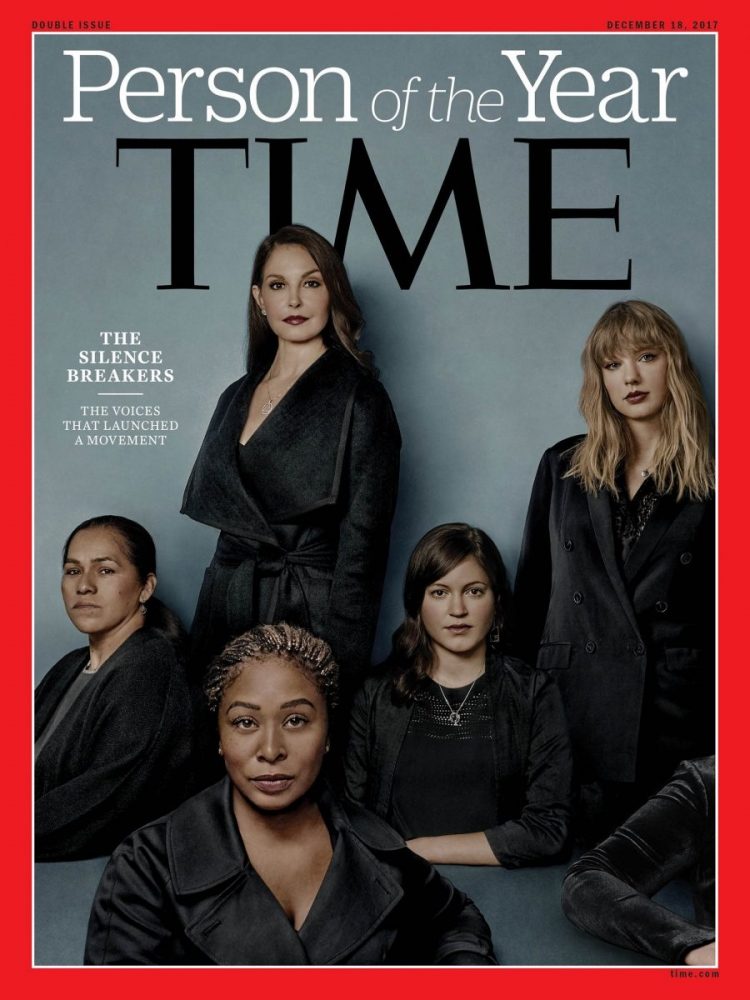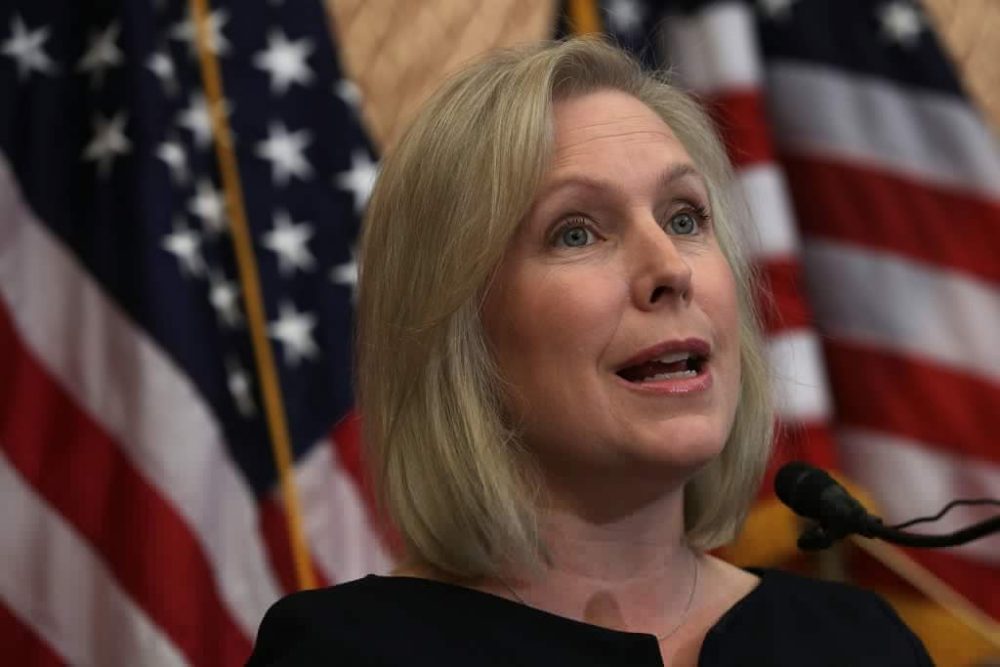Ouster of Al Franken from Senate suggests not all women are ready to embrace the #MeToo movement.
Sen. Al Franken (D-MN) resigned from the Senate Thursday. It was a moment weeks in the making and one many wished had come much sooner while others wished it hadn’t come at all.
Franken was leaving the Senate after eight years following a series of accusations that he had sexually harassed and assaulted women.
When the seventh woman, a former congressional staffer, came forward on December 6, twenty senators, including all the Democratic women, called for his ouster.
As New York Times reporter covering Congress, Yamiche Alcindor noted,
Women in the Senate are not having it today.
Senators Claire McCaskill, Maggie Hassan, Kirsten Gillibrand, PattyMurray, and Mazie K. Hirono all called on Senator Al Franken to resign Tuesday amid allegations from a growing number of women that he groped and harassed them.
— Yamiche Alcindor (@Yamiche) December 6, 2017
No, they were not.
Sen. Kirsten Gillibrand, who led the group, has been battling sexual assault from the Senate floor for years. Her work revealing the extent of sexual assault in the military and on college campuses has put her in the spotlight repeatedly.
She sponsored the Campus Safety and Accountability Act and has appeared in several documentaries on the topic of sexual assault. She is a strong supporter of LGBT rights.
But shortly after Gillibrand led the call, more than half of the Democratic senators had joined the list of those calling for Franken to resign, including Senate Minority Leader Chuck Schumer (D-NY) who said in a statement, “I consider Senator Franken a dear friend and greatly respect his accomplishments, but he has a higher obligation to his constituents and the Senate, and he should step down immediately.
Senate Majority Leader Mitch McConnell (R-KY), said he did not think that Franken could appropriately serve his constituents any longer.
The move to oust Franken was propelled in part by the Alabama senate race between homophobic judge Roy Moore and longtime civil rights attorney and LGBT ally Doug Jones. As a judge, Moore regularly broke up lesbian families.
Jones famously prosecuted men responsible for the racist killings of four young girls in the Birmingham 16th Street Baptist church bombing on September 15, 1963.
Alabama is one of the most conservative states in the nation and Moore was considered a lock until allegations that he had sexually harassed and assaulted young women and girls decades ago while a district attorney. One of the accusers was 14 at the time and said Moore undressed her and fondled her. They had met when her mother was at court for a separate matter.
#RoyMoore is a racist homophobe accused of sexually assaulting girls who isn’t sure black people should vote.#DougJones is a Civil Rights attorney who got justice for 4 black girls murdered by the Klan.
Those are Alabama’s choices for US Senate.
Not voting is voting for Moore.— Victoria Brownworth (@VABVOX) November 18, 2017
Moore, who was also banned from a local mall during those years for harassing and stalking young women and teenaged girls, has been termed a child molester by Democrats as well as by some Republicans who find Moore repugnant. Some pundits have suggested the push to remove Franken was so Moore could be challenged for similar reasons should he be elected Dec. 12.
President Trump, himself accused by more than a dozen women of sexual assault, has fully endorsed Moore, noting in a series of tweets and comments to the press that the Republicans in the Senate need Moore’s vote to pass Trump’s legislation. The Republicans currently hold a four vote lead over Democrats.
Never in history has a sitting POTUS knowingly endorsed a candidate accused of child molestation.
I’m not sure how Republicans come back from this.
— Victoria Brownworth (@VABVOX) November 21, 2017
The debate over Roy Moore and Trump’s accusers, plus the ongoing daily revelations of famous men in every industry facing accusations of sexual harassment and assault put Democrats in an awkward position regarding the mounting accusations against Franken.
When do these women get to be heard?
A brief guide to the 17 women Trump has allegedly assaulted, groped or harassed https://t.co/AggsEG4HtL?
— Victoria Brownworth (@VABVOX) November 17, 2017
One Capitol Hill source spoke to me the day before the call for Franken’s resignation. Another prominent Democrat House member, Rep. John Conyers (D-MI), the longest-serving member of the House, had been forced into retirement when accusations surfaced about him.
It was revealed Conyers had paid a former staffer to settle a harassment claim, “In any other industry [Franken] would have been fired after the first news story like Lauer, Rose and these other guys. If Conyers, with his record, could be forced out, it just looks like he’s getting a pass because he’s so well-liked by his friends.”
Jon Favreau, speechwriter for former President Barack Obama said:
I hope the Democratic men in the Senate step forward on Franken too. Shouldn’t just be women.
— Jon Favreau (@jonfavs) December 6, 2017
Mere hours before the group of women senators spoke out about Franken on Dec. 6, TIME magazine revealed its much-anticipated Person of the Year. The honor went to “The Silence Breakers: The Voices that Launched a Movement” – women who had broken the silence on the breadth of sexual harassment and assault in various industries, from entertainment to journalism to blue collar work to politics.
TIME editor-in-chief Edward Felsenthal explained why on Twitter:
For giving voice to open secrets, for moving whisper networks onto social networks, for pushing all of us to stop accepting the unacceptable, the Silence Breakers are the 2017 Person of the Year #TIMEPOY https://t.co/XID3QrgMWv pic.twitter.com/IvdW78Ke8v
— Edward Felsenthal (@efelsenthal) December 6, 2017
The stark TIME cover shows five women and one woman’s arm, all garbed in black. Singer/songwriter Taylor Swift and actress Ashley Judd were immediately recognizable. In addition to Swift and Judd and the anonymous sixth woman are former Uber engineer Susan Fowler, lobbyist Adama Iwu and Isabel Pascual, a strawberry picker and an immigrant from Mexico whose name was changed to protect her identity.
It’s an extraordinary image. Inside the issue there are more–myriad women as well as Terry Crews, the black former NFL start turned actor who revealed this year that he’d been sexually assaulted at a Hollywood party by a male producer.
The issue was wholly created by women, as TIME editor Charlotte Alter noted: “This was conceived, reported and written by women. It was fact-checked by women. The video was shot and edited by women. The layout and photo spread were designed by women. It’s one of the reasons I’m proud to work at TIME.”/TIME
So proud to join @SusannaSchrobs, @edockterman @haleybureau & @szacharek on the all-woman team that made this happen pic.twitter.com/aA6o12Gho6
— Charlotte Alter (@CharlotteAlter) December 6, 2017
The confluence of the two events–the TIME person of the year reveal and the decision by the Democratic women of the Senate that too much time had passed and too many women had come forward about Franken seemed prime Zeitgeist: #MeToo has driven the past few months and men simply aren’t able to shrug off their past sexual misconduct with women the way they have for generations.
When the TIME cover dropped early in the morning, there was instant response to Taylor Swift being featured on the cover. But many forget how much Swift did to lead on the issue of sexual assault in the music industry.
Swift was sued by a DJ she had accused of sexually assaulting her at a meet-and-greet. Colorado DJ David Mueller claimed he lost income due to her statements.

That was how Swift became the defendant in a trial that hinged on her being sexually assaulted in public by Mueller.
Swift could have settled–she has the money. She could have refused to testify. But she detailed–graphically–how Mueller touched her under her skirt. As Swift told TIME, “… there were a number of people in the room that saw this plus a photo of it happening.
I figured that if he would be brazen enough to assault me under these risky circumstances and high stakes, imagine what he might do to a vulnerable, young artist if given the chance.”
Swift’s words at the trial (TIME revealed it was the most times the word “ass” had been used in a Colorado courtroom) regarding victim-blaming were succinct. They were words women need to recall with regard to Franken.
The then-25-year-old Swift told Mueller’s attorney, “I’m not going to let you or your client make me feel in any way that this is my fault. Here we are years later, and I’m being blamed for the unfortunate events of his life that are the product of his decisions — not mine.”
The Swift story is instructive because of the way some women responded to the calls for Franken’s resignation–blaming everyone but Franken for the situation.
Since the first accusation against Franken was made a month ago, the first accuser, Leeann Tweeden, a radio news anchor in Los Angeles, has been slut shamed. A former model who appeared twice in Playboy, photos of her in those magazine spreads have appeared all over social media with suggestions that if she could pose nude, she surely wouldn’t mind a little groping and kissing.

Tweeden met Franken during one of the 20 USO tours she’s taken to Afghanistan and Iraq since 2002. Franken has acknowledged the incident and apologized and Tweeden herself has not called for his ouster.
But social media is rarely a fair playing field and the questions raised during the 24 hours between Gillibrand’s presser with the other senators and Franken’s official resignation were a shocking return to the time before #MeToo when women were held responsible for men’s behavior and “he said/she said” forced many women–like Anita Hill–to suffer in silence or lose their jobs.
The racial split on Twitter was telling. Women of color saw Franken’s actions as the reason for his ouster. White women were incensed. In a series of exchanges I had and others I witnessed, I was stunned to see so many women on the left side of the aisle calling Franken’s accusers sluts, liars, tools of Trump.
I was disappointed when women I’ve been conversing with over the long period of the election and it’s gutting aftermath were spewing the same rhetoric as people in Alabama about Moore’s accusers. Literally the only difference was I knew these women from social media and had believed them to be feminists.
 Senator Kirsten Gillibrand
Senator Kirsten Gillibrand
I asked women point blank: What is an acceptable amount of sexual harassment or assault? Is it okay if one of our guys does it? One of Franken’s accusers alleged he had grabbed her bare flesh and had forcibly kissed her. Several of Trump’s accusers have made similar accusations.
The more I asked women questions, the angrier they–and I–got. Women claimed the #MeToo movement was being diminished by the accusations against Franken yet no one could explain why those accusations weren’t believable while those made against Moore were. Many women–literally a few dozen–told me they “could tell” that Franken’s accusers were lying.
The argument that Franken shouldn’t leave until Trump was forced out of office spawned a hashtag #IStandWithFranken – a disturbingly misogynist twist on hashtags supporting raped and abused women victims.
Hours after Franken gave his speech, in which he cited both Trump and Moore, people were still raging against the women of the Senate–in particular Kirsten Gillibrand. The term witch hunt was being used and there were calls for her to be voted out next year when she comes up for re-election.
She was accused of not being hard enough on Trump. Yet Gillibrand holds the most progressive record of any senator. She has voted against Trump on all but one occasion (and that vote was unanimous among all Democrats) since he took office.
Franken, a 66 year old grandfather, was repeatedly referred to as having had “youthful indiscretions” and having been a “nerd boy fumbling around.” But Franken has been married since 1975. So why was he fumbling with anyone but his wife? There’s no scenario in which Franken looks blameless.
Was there a rush to judgment on Franken? No. He apologized and thought it would be enough–which is itself an entitled response and one that is no longer valid in the #MeToo era.
It is possible for people on the left to regret losing Franken–I’ve always liked him, both in his role as a comedian and as a senator–and also know that it was appropriate to ask that he leave.
Let’s not call men who touch women without their consent “martyrs.”#Franken‘s being forced to resign because women keep coming forward with allegations.
Holding men accountable for their actions doesn’t make them martyrs.
Other men are being fired for these actions. https://t.co/SZLidJOJLI— Victoria Brownworth (@VABVOX) December 7, 2017
Centering men is what we are used to doing. Protecting defenseless men from evil women has been a meme since the Garden of Eden when Eve was blamed for everything.
But it’s eons past time to center women and equally past time for believing women. Calling women liars, claiming they make accusations for attention or money is a form of silencing.
White women in my mentions saying we should give some men a pass on sexual harassment & assault is why generations of women have not been able to come forward with their stories.
Please don’t contribute to the silencing of women.
Hold men accountable for their actions.— Victoria Brownworth (@VABVOX) December 7, 2017
Franken could have stayed in the Senate and fought. But he knew that his acknowledging that at least some of the allegations were true made him culpable. In his speech Franken was tearful.
But I’m not tearful for him. He wasn’t a civil rights icon like Conyers. He wasn’t a progressive firebrand like Gillibrand or Kamala Harris or Elizabeth Warren. He was a solid, serviceable senator with a few recent shining moments.
I like him, but I wish he had shown more bravery like the women in the TIME story or down the aisle from him in the Senate.
The choices Franken made he made alone and he must suffer the consequences of those choices alone. If there had been a moment of concern for his female colleagues who were forced to ask him to quit because he refused to do so, he could have made a statement of apology to them in his speech.
He did not. Rather he suggested that he should not have to leave and that these women weren’t doing their best in holding Trump’s feet to the fire–something Gillibrand and Harris have done and Franken has not.
We have a long way to go to fix what’s been broken between men and women in this country. This was one chapter. If we allow women to be scapegoated for Franken’s actions, we are moving backward not forward.
And that would hurt women immeasurably when they have suffered more than enough, nearly always in silence. The Democratic women of the Senate were forced to be silence breakers. Applaud that, don’t dismiss it.
